
Astrology is a range of divinatory practices, recognized as pseudoscientific since the 18th century, that claim to discern information about human affairs and terrestrial events by studying the apparent positions of celestial objects. Different cultures have employed forms of astrology since at least the 2nd millennium BCE, these practices having originated in calendrical systems used to predict seasonal shifts and to interpret celestial cycles as signs of divine communications. Most, if not all, cultures have attached importance to what they observed in the sky, and some—such as the Hindus, Chinese, and the Maya—developed elaborate systems for predicting terrestrial events from celestial observations. Western astrology, one of the oldest astrological systems still in use, can trace its roots to 19th–17th century BCE Mesopotamia, from where it spread to Ancient Greece, Rome, the Islamic world, and eventually Central and Western Europe. Contemporary Western astrology is often associated with systems of horoscopes that purport to explain aspects of a person's personality and predict significant events in their lives based on the positions of celestial objects; the majority of professional astrologers rely on such systems.

The zodiac is a belt-shaped region of the sky that extends approximately 8° north and south of the ecliptic, which is the apparent path of the Sun across the celestial sphere over the course of the year. The orbital paths of the Moon and major planets are within the belt of the zodiac.

A horoscope is an astrological chart or diagram representing the positions of the Sun, Moon, planets, astrological aspects and sensitive angles at the time of an event, such as the moment of a person's birth. The word horoscope is derived from the Greek words ōra and scopos meaning "time" and "observer". It is claimed by proponents of astrology that a horoscope can be used as a method of divination regarding events relating to the point in time it represents, and it forms the basis of the horoscopic traditions of astrology, although practices surrounding astrology have been recognized as pseudoscientific since the 18th century. Horoscope columns are often featured in print and online newspapers.

Western astrology is the system of astrology most popular in Western countries. Western astrology is historically based on Ptolemy's Tetrabiblos, which in turn was a continuation of Hellenistic and ultimately Babylonian traditions.

In astrology, an aspect is an angle that planets make to each other in the horoscope; as well as to the Ascendant, Midheaven, Descendant, Lower Midheaven, and other points of astrological interest. As viewed from Earth, aspects are measured by the angular distance in degrees and minutes of ecliptic longitude between two points. According to astrological tradition, they indicate the timing of transitions and developmental changes in the lives of people and affairs relative to the Earth.

Hindu astrology, also called Indian astrology, or Jyotisha ; from jyót "light, heavenly body", and more recently Vedic astrology, is the traditional Hindu system of astrology. It is one of the six auxiliary disciplines in Hinduism that is connected with the study of the Vedas.
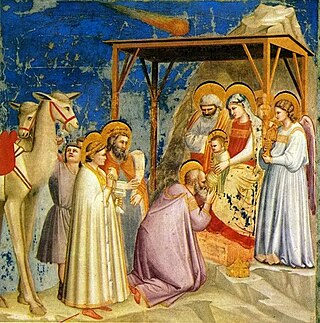
The Star of Bethlehem, or Christmas Star, appears in the nativity story of the Gospel of Matthew chapter 2 where "wise men from the East" (Magi) are inspired by the star to travel to Jerusalem. There, they meet King Herod of Judea, and ask him:
Where is He who has been born King of the Jews? For we have seen His star in the East and have come to worship Him.

An astrological age is a time period which, according to astrology, parallels major changes in the development of human society, culture, history, and politics. There are twelve astrological ages corresponding to the twelve zodiacal signs in western astrology. One cycle of the twelve astrological ages is called a Great Year, comprising 25,772 solar years, at the end of which another cycle begins.

Mundane astrology, also known as political astrology, is the branch of astrology dealing with politics, the government, and the laws governing a particular nation, state, or city. The name derives name from the Latin term mundus, 'world'.

Natal astrology, also known as genethliac astrology or genethlialogy, is a system of astrology that claims to shed light on an individual’s personality or path in life based on constructing a horoscope or natal chart that includes the exact date, time, and location of an individual's birth. Natal astrology is found in the Indian, Chinese, Hellenistic and Western astrological traditions.
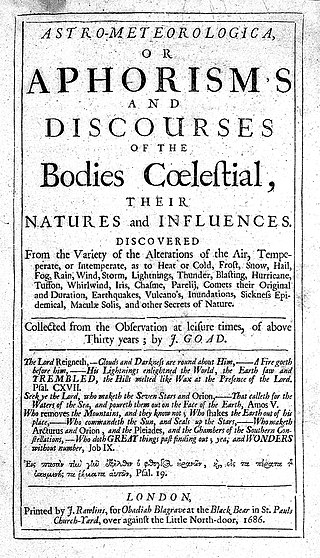
Astrometeorology or meteorological astrology is a pseudoscience that attempts to forecast the weather using astrology. It is the belief that the position and motion of celestial objects can be used to predict both seasonal climate and weather. Throughout most of its history astrometeorology was considered a scholarly tradition and was common in academic circles, often in close relation with astronomy, alchemy, meteorology, medicine, and other types of astrology.
Cancer is a large class of malignant diseases.
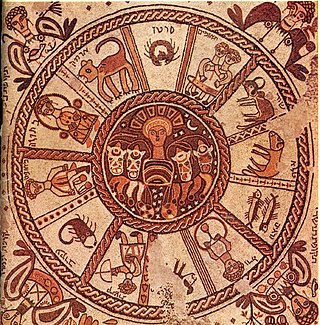
Astrology has been a topic of debate among Jews for over 2000 years. While not a Jewish practice or teaching as such, astrology made its way into Jewish thought, as can be seen in the many references to it in the Talmud. Astrological statements became accepted and worthy of debate and discussion by Torah scholars. Opinions varied: some rabbis rejected the validity of astrology; others accepted its validity but forbid practicing it; still others thought its practice to be meaningful and permitted. In modern times, as science has rejected the validity of astrology, many Jewish thinkers have similarly rejected it; though some continue to defend the pro-astrology views that were common among pre-modern Jews.

Māshāʾallāh ibn Atharī, known as Mashallah, was an 8th century Persian Jewish astrologer, astronomer, and mathematician. Originally from Khorasan, he lived in Basra during the reigns of the Abbasid caliphs al-Manṣūr and al-Ma’mūn, and was among those who introduced astrology and astronomy to Baghdad. The bibliographer ibn al-Nadim described Mashallah "as virtuous and in his time a leader in the science of jurisprudence, i.e. the science of judgments of the stars". Mashallah served as a court astrologer for the Abbasid caliphate and wrote works on astrology in Arabic. Some Latin translations survive.
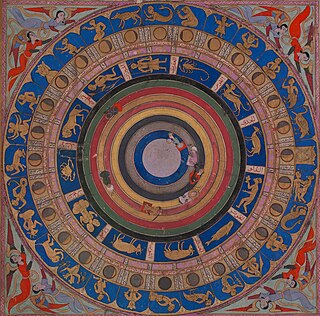
Some medieval Muslims took a keen interest in the study of astrology, partly because they considered the celestial bodies to be essential, partly because the dwellers of desert-regions often travelled at night, and relied upon knowledge of the constellations for guidance in their journeys. After the advent of Islam, the Muslims needed to determine the time of the prayers, the direction of the Kaaba, and the correct orientation of the mosque, all of which helped give a religious impetus to the study of astronomy and contributed towards the belief that the heavenly bodies were influential upon terrestrial affairs as well as the human condition. The science dealing with such influences was termed astrology, a discipline contained within the field of astronomy. The principles of these studies were rooted in Arabian, Persian, Babylonian, Hellenistic and Indian traditions and both were developed by the Arabs following their establishment of a magnificent observatory and library of astronomical and astrological texts at Baghdad in the 8th century.
Yoga, a Sanskrit word with a general meaning of "connection, conjunction, attachment, union": a generic term for several physical, mental, and spiritual disciplines originating in ancient India.
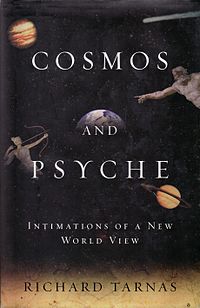
Cosmos and Psyche: Intimations of a New World View is a 2006 book by cultural historian Richard Tarnas, in which the author proposes the existence of relationships between planetary transits and events in the lives of major historical figures, as well as cultural events.

Astrology consists of a number of belief systems that hold that there is a relationship between astronomical phenomena and events or descriptions of personality in the human world. Astrology has been rejected by the scientific community as having no explanatory power for describing the universe. Scientific testing has found no evidence to support the premises or purported effects outlined in astrological traditions.

Astrology in Jewish antiquity is the belief that celestial bodies can influence the affairs of individuals and of entire nations upon the earth. This involves the study of the celestial bodies' respective energies based on recurring patterns that change by the hour, by the week, month, year or by several years. In each of these time categories one of the seven planetary spheres, or what are known as the seven classical planets: the Sun, Venus, Mercury, the Moon, Saturn, Jupiter, or Mars, along with the month's current Zodiac constellation, come into play and influence the sublunary world. At times, it involves a complex combination of several of these factors working together. In Judaism this belief is expressed by the biblical affirmation: "Do you know the laws of heaven / Or impose its authority on earth?" (Job 38:33), from which statement the Sages of Israel have inferred, "There is no single herb below without its corresponding star above, that beats upon it and commands it to grow."









